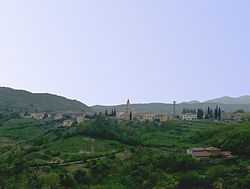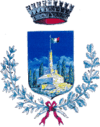Rivoli Veronese
| Rivoli Veronese | ||
|---|---|---|
| Comune | ||
| Comune di Rivoli Veronese | ||
 | ||
| ||
 Rivoli Veronese | ||
| Coordinates: 45°34′N 10°49′E / 45.567°N 10.817°E | ||
| Country | Italy | |
| Region | Veneto | |
| Province | Verona (VR) | |
| Frazioni | Canale, Gaium | |
| Government | ||
| • Mayor | Mirco Campagnari | |
| Area | ||
| • Total | 18.45 km2 (7.12 sq mi) | |
| Elevation | 191 m (627 ft) | |
| Population (1 November 2010)[1] | ||
| • Total | 2,129 | |
| • Density | 120/km2 (300/sq mi) | |
| Demonym | Rivolesi | |
| Time zone | CET (UTC+1) | |
| • Summer (DST) | CEST (UTC+2) | |
| Postal code | 37010 | |
| Dialing code | 045 | |
| Patron saint | St. Isidore | |
| Saint day | 11 July | |
| Website | Official website | |
Rivoli Veronese is a comune in Veneto, Italy, in the Province of Verona, on a hill on the right bank of the Adige, 20 km miles NW of Verona.
History
Rivoli Veronese is celebrated as the scene of the Battle of Rivoli in which, on the 15 January 1797, Napoleon inflicted a decisive defeat upon the Austrians commanded by Joseph Alvinczy. A famous street in Paris (Rue de Rivoli) commemorates the victory, and under the empire Marshal André Masséna received the title of duke of Rivoli.
The strong positions around Rivoli, which command the approaches from the County of Tyrol and the upper Adige into the Italian plain, have always been celebrated in military history as a formidable obstacle, and Charles V and Prince Eugene of Savoy preferred to turn them by difficult mountain paths instead of attacking them directly. Minor engagements, such as rearguard actions and holding attacks, have consequently often taken place about them, notably in the campaign of 1796–97.
An engagement of this character was fought here in 1848 between the Austrian and the Piedmontese troops during the First Italian War of Independence.
People
- Sara Simeoni (born April 19, 1953), Italian high jumper
References
 This article incorporates text from a publication now in the public domain: Chisholm, Hugh, ed. (1911). Encyclopædia Britannica (11th ed.). Cambridge University Press
This article incorporates text from a publication now in the public domain: Chisholm, Hugh, ed. (1911). Encyclopædia Britannica (11th ed.). Cambridge University Press
